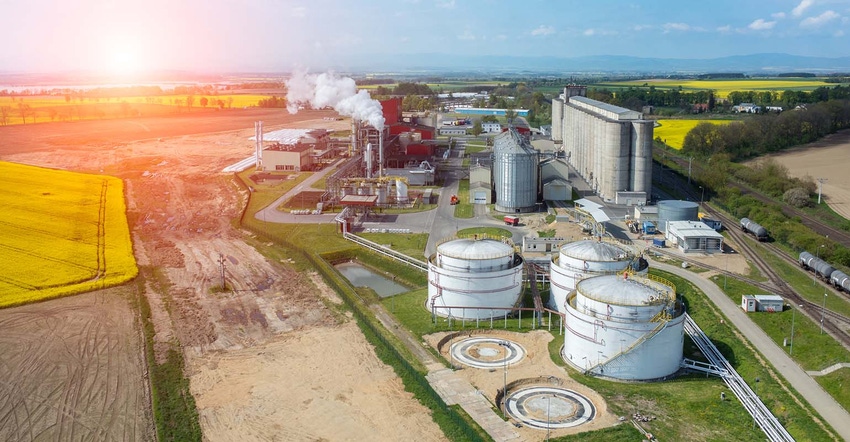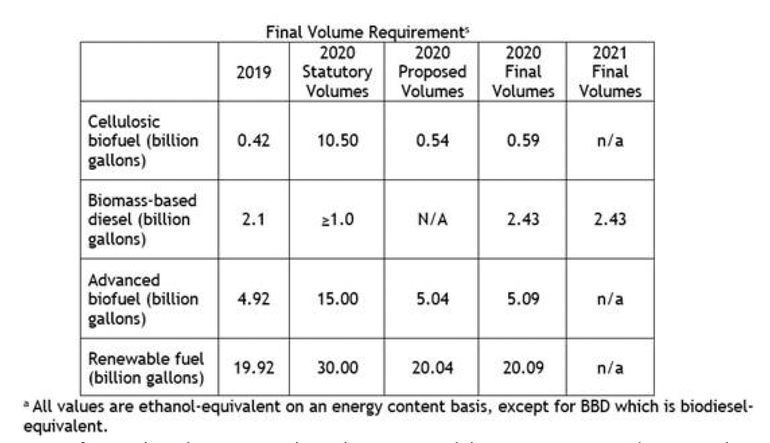December 19, 2019

The U.S. Environmental Protection Agency finalized a rule Dec. 19 that establishes the required renewable volumes under the Renewable Fuel Standard program for 2020, and the biomass-based diesel volume for 2021.
As proposed, they are finalizing a projection methodology based on the 2016-2018 annual average of exempted volumes had EPA strictly followed the Department of Energy recommendations of 770 million Renewable Identification Numbers in those years, including granting 50% relief where DOE recommended 50% relief. This is their general approach to adjudicating Small Refinery Exemption petitions going forward, beginning with 2019 SRE petitions and including 2020 SRE petitions and beyond, they are committed to following the DOE recommendations. By proposing effectively 15.8 billion gallons for 2020 they will ensure meeting their target of 15 billion gallons.
The key elements of the action:
“Conventional” biofuel volumes, primarily met by corn ethanol, will be maintained at the 15 billion gallon target set by Congress for 2020.
Cellulosic biofuel volumes for 2020, and thus advanced biofuel volumes, will increase by almost 170 million gallons over the 2019 standard.
Biomass-based diesel volumes for 2021 will be equivalent to the standard for 2020, still more than double the statutory requirement.
EPA will closely examine the labeling requirements for E15 fuel and move forward with clarifying regulations as needed.
EPA has modified the way RFS obligations are determined to better ensure that these volumes are met, while still allowing for relief for small refineries consistent with the direction provided by Congress under the statute. By proposing effectively 15. 8 billion gallons we will net out at 15 billion.

What's the reaction?
House Agriculture Committee Chairman Collin Peterson, D-Minnesota, who is also co-chair of the Congressional Biofuels Caucus, blasted the announcement.
“The administration has repeatedly directed the EPA and other agencies to support the ethanol industry and corn farmers, and the EPA has told those farmers to trust them," Peterson said. "Instead we’re seeing a final rule out of EPA that doesn’t guarantee the 15 billion gallons the RFS mandates. At a time when our agriculture economy is struggling, the EPA has ripped 4 billion gallons of ethanol out of the market and impacted corn prices and rural communities. We also have yet to see the other things that were promised to the biofuels industry and corn farmers to get more ethanol into the market via infrastructure incentives and policies related to higher ethanol blends.”
Iowa Sen. Chuck Grassley, put the ball firmly in EPA's court.
“Once again, EPA is playing games and not helping President Trump with farmers," said Grassley, a Republican. "An agreement was reached on September 12 in an Oval Office meeting between several Midwest leaders, President Trump and other members of his administration. This does not reflect what we agreed to in that meeting. Simply requiring that the three-year rolling average be based on hard data and actual waived gallons rather than Department of Energy recommendations and EPA discretion would solve this problem and ensure the renewable volume obligations are met. Administrator Wheeler has put the president in a bad situation by not following the law as intended by Congress and as the president has promised to uphold. No matter what EPA says about the impact of its waivers to oil companies making billions in profits, farmers and biofuels producers know and feel the negative impact of the agency’s actions. I will hold EPA’s feet to the fire to make certain they abide by the Department of Energy’s recommendations and ensure integrity in the RFS. Whether that happens is up to Administrator Wheeler and the president’s support among farmers is in his hands. The magic words from the Oval Office meeting were three-year rolling average based on hard data and actual waived gallons. Abiding by this would have solved all the problem’s EPA has created.”
The Renewable Fuels Association gave the final rule a failing grade.
“After EPA’s overwrought abuse of the SRE program in recent years, agency officials had a chance to finally make things right with this final rule—but they blew it," said Geoff Cooper, president and CEO of the Renewable Fuels Association. "While the final rule is an improvement over the original proposal, it still does not guarantee that the law’s 15-billion-gallon conventional biofuel blending requirement will be fully enforced by EPA in 2020.”
The National Biodiesel Board is also disappointed with the final rule. They say the rule blocks growth in the biodiesel industry and finalizes a method that underestimates future small refinery exemptions, counting only half of the exempted volumes actually granted over the past three years.
“Despite his statement to the press, Administrator Wheeler’s method for estimating future small refinery exemptions does not provide assurance to the biodiesel and renewable diesel market," said Kurt Kovarik, National Biodiesel Board vice president of federal affairs. "The best estimate of future exemptions is an average of the 38 billion gallons exempted over the past three years. Even if EPA had included that estimate, though, there is nothing in today’s rule to ensure that the agency will get these exemptions under control.”
The estimate of small refinery exemptions applies equally to the overall, advanced, biomass-based diesel, and cellulosic biofuel renewable volume obligations. While intended to ensure that the 2.43 billion biomass-based diesel volume for 2020 is fulfilled, the number of exempted volumes could still exceed EPA’s estimate.
In today’s rule, EPA defers a final determination on the U.S. Court of Appeals’ remand of the 2016 rule, in which the agency waived 500 million gallons of biofuel use. “The biodiesel industry asks EPA to fulfill the Court’s clear direction to restore the 500 million gallons from 2016. The agency has recognized that it must ensure that the RFS volumes are met. EPA must be consistent.”
The Iowa Corn Growers was blunt in their assessment of the rule.
“Apparently President Trump doesn’t care about his promise to Iowa’s farmers. He had the opportunity to tell his EPA to stick to the deal that was made on October 4,” said ICGA President Jim Greif.
“The Environmental Protection Agency seems to be more concerned with politics than cleaner-burning, healthy air with renewable fuels. It was as simple as following the original October 4 agreement with our elected officials and here we are with empty promises and no market certainty,” said Kelly Nieuwenhuis, ICGA member from Primghar and Chair of the Iowa Corn Industrial Usage and U.S. Production committee.
The National Corn Growers Association says the responsibility for holding the administration accountable now falls on corn producers.
“The administration has chosen to move forward with a final rule that corn farmers believe falls short of adequately addressing the demand destruction caused by EPA’s abuse of RFS refinery waivers," said NCGA President Kevin Ross. "While using the DOE recommendations to account for waivers is an improvement over the status quo, it is now on corn farmers to hold the administration to their commitment of a minimum of 15 billion gallon volume, as the law requires. We will use future rulemakings and other opportunities to hold the EPA accountable.”
About the Author(s)
You May Also Like




